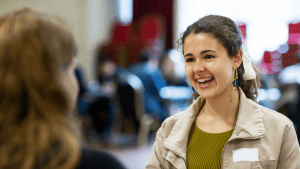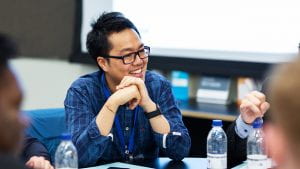Read time: 5 minutes
Written by Isabel Scavetta, UCL Alumni.

UCL alumni Isabel Scavetta (BA ESPS), recently featured in an article with the BBC about her changing career expectations and we couldn’t resist chatting to her more about her experiences. Our interview with Isabel is truly fascinating, covering her studies and time at UCL, beyond graduation and her multifaceted career journey so far. We really hope that you gain some career inspiration from reading our conversation.
1. Since graduating from UCL, you’ve spoken about a “complete career pivot” and being “grateful for having to re-evaluate”. Can you tell us more about your career journey so far?
I’m currently known for my work in the technology field, especially around improving its accessibility and diversity, which feels ironic given that I come from a non-technical background!
During my studies at UCL, I wasn’t sure what I wanted to do after graduating. I did a couple of internships, attended a variety of careers-focused events and studied in both London and Seville. Through that time, I learned that I loved creative problem solving, teamwork and building solutions with real-world impact. I graduated in the pandemic summer so decided there was no time like the present to challenge myself to pursue my interest in tech.
What makes technology stand out for me is how I’m engaged by learning more. Many other industries have a slower pace of change whereas, for me, tech has only become more interesting as my journey has progressed.
So, I started coding with Code First Girls, studied for and passed several Microsoft qualifications, participated in technology conferences and Hackathon challenges, and reached out to women in the industry. Before long, my hard work started to pay off and I was able to use this experience to start giving back to others, achieving a Fellowship at Code First Girls, advisory position at Microsoft on their TechHer Student initiative, and an internship in Rolls-Royce’s Data & AI Hub (R2 Data Labs).
2. As a UCL graduate, BA European Social & Political Studies (ESPS), you have commented that your degree helps you “every day to quickly understand new concepts, communicate clearly, and draw connections across diverse subject areas”. Could you expand on this thought? What other transferable skills have your UCL experiences given you?
People often say to me that I’ve made an amazing transition from my undergraduate studies, but I think there’s lots of complementary elements between them. The main skill that ESPS taught me was the ability to pick up new concepts and develop an in-depth understanding of them in a very short period of time. In one degree, you could study across 9 different humanities departments, and in our first year, we had an exam covering all of them! This is vital in industries such as consulting and technology because you’re constantly introduced to disparate subjects and you need to try and figure out ways in which they are similar to things you’ve seen before, and also what differentiates them.
I was an active student at UCL, as I was involved in several societies, mentorship programmes and sports clubs. Balancing my various commitments and part-time work alongside my studies helped me to become proactive and self-organised, which has been helpful in my career so far.
Also, as a London based student I got the chance to go to some really brilliant networking events over the years and these taught me a lot about presentation skills, strategy, communication and clarity which have helped in developing my personal online presence and a compelling story as to why I could be a great leader in technology.
3. You recently taught yourself coding, and volunteered at the online project, Class of 2020. How have extra-curricular activities and voluntary experiences aided your career journey?
My voluntary work and extracurricular activities were essential to making the transition into technology, and “bridging the gap” between my degree and my interest.
To begin, they showed I had an active interest in this field, which gave me a lot of content to talk about at interviews. Furthermore, they helped me to expand my technical knowledge, which wasn’t something that I had the opportunity to do during my time at UCL.
One of the silver linings of the pandemic was that so many organisations made their online learning resources accessible and free to use, which was the purpose of the Class of 2020 project. I’ve written an article where I’ve listed some of my personal favourites.
4. You’re now undertaking a remote internship in Artificial Intelligence at Rolls Royce. What does a normal working day look like for you?
My time is primarily spread across two parts of the AI Hub. I’m interested in business and strategy, so I don’t actually code in my day job!
Firstly, I’m working on an innovation project where we are designing a new capability that has potential to disrupt the industries that we operate in. Secondly, I work to implement agile methodology on an AI-based project, where I liaise with my cross-functional team to ensure that what we’re building runs to our business objectives.
Due to this there’s no such thing as a typical working day for me, but often I will be conducting interviews with experts in AI across the field, ensuring that our data scientists in the UK and abroad are working collaboratively, resolving any impediments my team may face and contributing to group synthesis and design thinking workshops.
5. You’ve spoken candidly about overcoming “decision fatigue.” If you could give a UCL student any advice when thinking about future career planning, what would that be?
Some really good advice I was given was to work backwards when you think of career choices. So, rather than choosing a job you think you want and seeing if it fits, think about what lifestyle and experiences fit you, then see what jobs align with that.
For example, do you prefer to work independently or collaboratively? Do you enjoy more analytical or qualitative work?
This is a useful frame of reference because it’s something that you can map your existing experiences to, no matter how much or how little work experience you have.
When I first started my job search, I actually sat down and wrote out a map of everything I knew about myself in terms of what I was good at and what I wanted to develop. This is helpful because it helps you take a more open-minded approach to job hunting. I applied for a really wide variety of roles – some in strategy, research, tech, healthcare – but the constant was that I knew that this was the kind of work I would find engaging. Sometimes that meant I was applying for very different roles and very different Industries!
6. Did you make use of the services/events UCL Careers offer during your time here?
I booked a one-on-one UCL careers appointment in my final year, which was useful because it allowed me to articulate to someone new what kind of careers I was interested in, and why I wanted to pursue them. I think that was a really good exercise to start thinking about my job hunt and also not to feel like it was such a solo mission. It depends on what you’re interested in, but I know that UCL Careers do sector-specific career weeks etc. that a lot of my course-mates in the Politics department enjoyed.
7. What is on your bookshelf right now?
The book I tell everyone to read is Invisible Women by Caroline Criado Perez, which is all about the implicit gender bias in data. It’s a harrowing but impactful read about the ways in which the systems we use can work against us, and a great first introduction to why an intersectional approach is necessary in technology (and other industries!) as we build for the future.
 Close
Close













 Earlier this month SOAS Careers Service ran a discussion panel on LGBTQ+ experiences in the workplace. Sitting on the panel were LGBTQ+ professionals employed in a range of sectors; we heard from two management consultants, an artist, a charity worker, a higher education professional, a digital marketer, and a jobseeker. Three of the panellists had past experience in teaching, one had spent time in recruitment. The panel kindly shared a variety of thought-provoking views and personal experiences. The main messages I took away were:
Earlier this month SOAS Careers Service ran a discussion panel on LGBTQ+ experiences in the workplace. Sitting on the panel were LGBTQ+ professionals employed in a range of sectors; we heard from two management consultants, an artist, a charity worker, a higher education professional, a digital marketer, and a jobseeker. Three of the panellists had past experience in teaching, one had spent time in recruitment. The panel kindly shared a variety of thought-provoking views and personal experiences. The main messages I took away were: